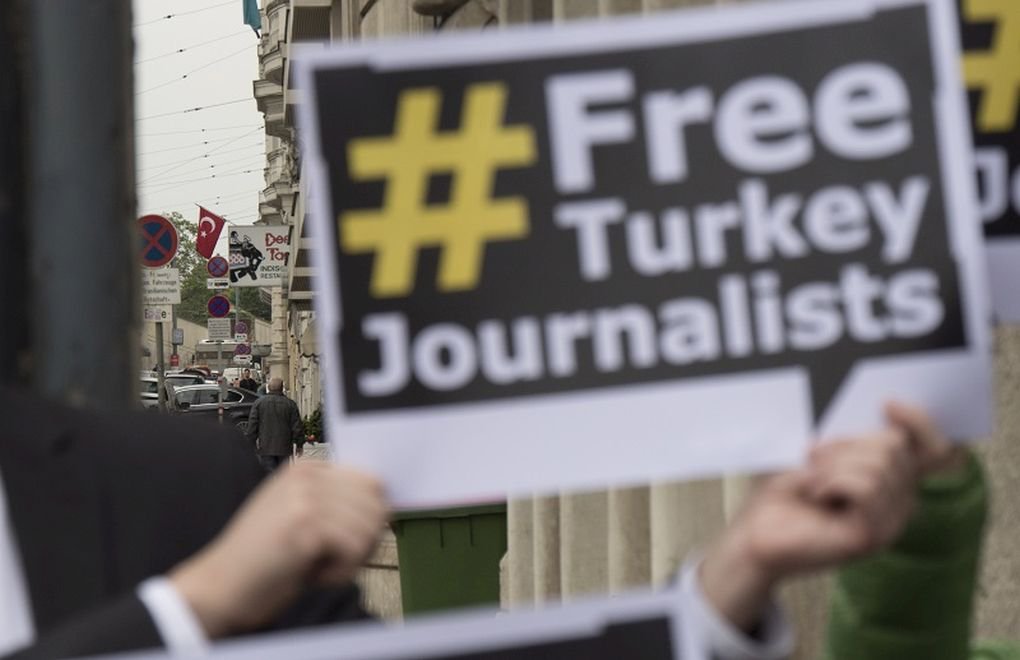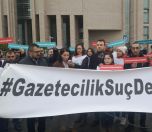Pandemic Increases Climate of Fear for Journalists in Turkey, Says Amnesty International

* Photo: Twitter
Click to read the article in Turkish
Ahead of World Press Freedom Day (May 3), Amnesty International released a statement, raising concerns that novel coronavirus (COVID-19) pandemic increases climate of fear for journalists in Turkey.
The organization has also called on the authorities in Turkey to unconditionally release all jailed journalists, who have been excluded from reduced prison sentences and early release amid COVID-19 pandemic as per the newly enacted law on criminal enforcement.
"The COVID-19 crisis has added a new layer to the crackdown on media freedom in Turkey with journalists being targeted across the country under the guise of combating misinformation," the organization has said.
Referring to Turkey as "one of the biggest jailers of journalists," it has reminded the public that the country has "seen journalists facing criminal investigation and detention for reporting or even tweeting on COVID-19."
'Outbreak gives authorities an additional excuse'
Commenting on the issue, Milena Buyum, the Turkey Campaigner of Amnesty International, has also briefly stated the following:
"Since the 2016 coup attempt, journalists in Turkey have faced the constant threat of arbitrary detention and prosecution. The COVID-19 outbreak has given authorities an additional excuse to target the media.
"Journalists reporting on COVID-19 or even posting on social media, fear they may join the swathes of Turkey's independent media workers currently languishing behind bars, held for months on end without trial, or facing prosecution on the basis of vague anti-terrorism and other laws limiting the right to freedom of expression."
'Release all journalists unconditionally'
Amnesty International has also referred to the newly enacted law on criminal enforcement, which has excluded arrested journalists and political prisoners from early release amid COVID-19 pandemic.
Buyum has said, "Turkey's already beleaguered journalists face new threats since the COVID-19 outbreak. They face censorship, criminal investigations and prosecution if they report critically on the pandemic, whilst those already inside Turkish jails face the danger of infection."
Concluding her remarks, Buyum has made a call to the authorities in Turkey reiterated that "Turkey's government must act now and unconditionally release all journalists jailed simply for doing their job."
'Media freedom and COVID-19 in Turkey'In its statement on Turkey, Amnesty International has shared the following overview about the journalists who have so far been detained or investigated over their journalistic activities related to the pandemic: "Former Halk TV editor-in-chief, Hakan Aygün, was remanded in prison on 4 April because of his social media posts on Facebook and Twitter criticizing Turkey's President Erdoğan's sharing of a bank account number for donations from the public to help with the pandemic. "Hakan is charged under articles prohibiting 'inciting the public to enmity and hatred' and 'insulting the religious beliefs of a section of society'. An indictment has already been drawn up and his first hearing will take place on 6 May. "Fox TV presenter, Fatih Portakal, is being investigated for 'insulting the President' and for 'deliberately damaging the reputation' of banks following a complaint by the Banking Regulation and Supervision Agency (BDDK) for a tweet on 6 April in which he compared the COVID Aid appeal to additional taxes collected during the war of independence at the end of WW1. Portakal's tweet was blocked by court order on 8 April. On 30 April, media reported that an indictment had been drawn up with the allegation that Portakal's tweet had damaged the reputation of banks. "Three broadcasts of the news programme he presents are being investigated for allegedly violating Article 8/1b of the "Law on the Establishment of Radio and Television [Channels] and Broadcast Services" which pertains to incitement, enmity and hatred during broadcasts. "On 18 March, police detained İsmet Çiğit, the editor-in-chief of SES Kocaeli, following the publication of an article on their website about the death of two people in a local hospital from COVID-19. The newspaper's executive, Güngör Aslan, who is responsible for the website, was summoned by the authorities the next day. He was detained, and İsmet Çiğit was released. Both were questioned about their sources in the hospital and both felt pressure to stop their reporting on the issue. Güngör Aslan was also released the following day after giving a statement to the prosecutor. "Journalist and human rights defender Nurcan Baysal, was summoned to the Diyarbakır Security Directorate on 31 March after writing an article and posting on social media about measures taken in Diyarbakır's prisons and in the city in relation to COVID-19. She presented herself to the prosecutor who questioned her about a number of tweets and her article." |
(RT/SD)






